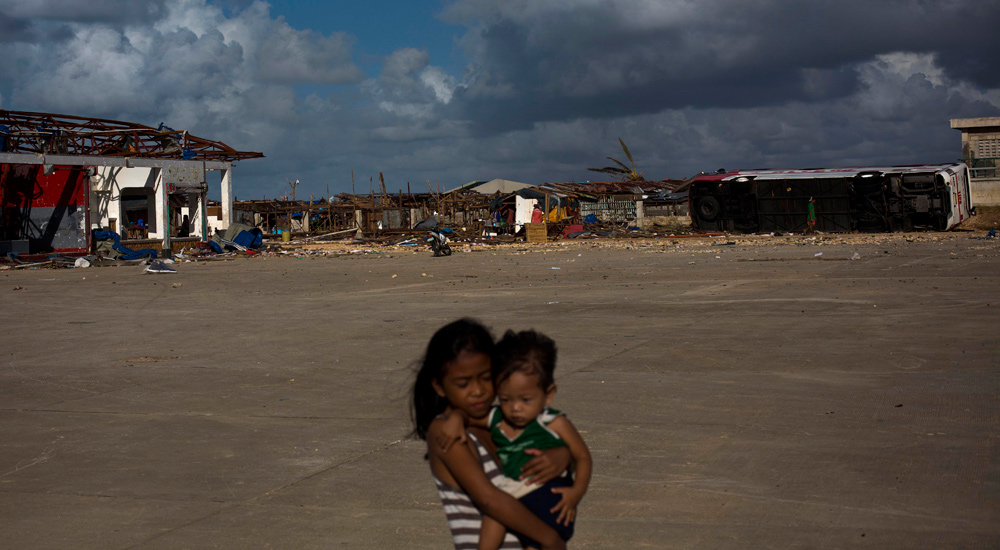
Typhoon Haiyan survivors walk at the destroyed port in the town of Guiuan, Eastern Samar, Friday, Nov. 15, 2013. Three days after the typhoon struck last Nov. 8, Susan Tan’s grocery store and warehouse in Guiuan were ransacked by hungry townsmen and she lost P10 million worth of goods. But she has opted to forgive them, she said, blaming the government instead for its slow response to the needs of the typhoon victims. AP PHOTO/DAVID GUTTENFELDER
GUIUAN, Eastern Samar—For Susan Tan, it was a case of forgive and forget.
The 43-year-old grocer of Chinese descent said she was shocked and disappointed to see friends, government employees and even policemen among those who ransacked her grocery store and warehouse after Supertyphoon “Yolanda” flattened the town at the edge of the Pacific Ocean.
She did not take it against the looters but instead pinned the blame on the government’s slow response to the worst disaster ever to hit Guiuan, site of a US-built air and naval base from where US Gen. Douglas MacArthur launched the allied offensive against the Japanese in the final stages of World War II.
Tan recounted that she and her employees were still able to sell goods on Saturday and Sunday after the typhoon, packing peak winds of more than 270 kilometers per hour, smashed across the coastal town from the Pacific on its first landfall.
The looting started on Monday at 8 a.m. The food shelves were cleaned first. And then the chairs, furniture and fixtures.
“I was there watching and I couldn’t do anything to stop the mob,” she said in an interview at the now empty store with only a few shelves left.
“Everybody knew everybody here. There were government employees, policemen and even my friends,” she said recounting that one policeman was even wearing his uniform.
Then her warehouse was pillaged, along with other small and big stores in Guiuan, a tranquil seaside town before the monster typhoon turned it into a wasteland.
She was already planning to give away her goods to the municipal hall, thinking her warehouse would be sacked anyway.
The local government had even sent her a military escort to help her bring three truckloads of goods to the municipal hall. But after the soldiers left, the mobs descended on the warehouse.
Forgive and forget
Tan lost P10 million worth of goods, most of which she had purchased on loans. The losses have not turned her bitter. Instead, she opened what remains of her store to people seeking to talk to their loved ones, allowing them the make three-minute calls provided for free by Smart Communications.
In the first week after the typhoon, a long queue of residents lined up outside her thrashed store, hoping to get a chance to make a call.
Asked why she opted to stay, she said: “There’s nothing you can do but help. I’ll just forgive and forget.”
She said helping her fellow Guiuanons helped her regain her sanity after the typhoon.
Tan turned emotional recounting an encounter with one looter. “I was standing behind her back. She was sitting there, tired from the looting,” she said. “She saw me and said: ‘Thank you.’ I almost cried.”
When the looter told her it was the birthday of her child, she found herself telling her, “You get some more.”
Tan blamed the slow government response for the looting.
“People panicked. They thought no relief was coming. There was no single word from the government,” she said.
Had the people been assured that assistance was forthcoming, they would not have dared resort to looting.
The typhoon spared no one and no place, with roofs, walls and appliances flying everywhere. At least 99 of Guiuan’s 47,000 residents perished in the typhoon.
Renee Patron, a Filipino-American, said the residents knew the typhoon was coming. But she asked, “Who can prepare for the worst?”